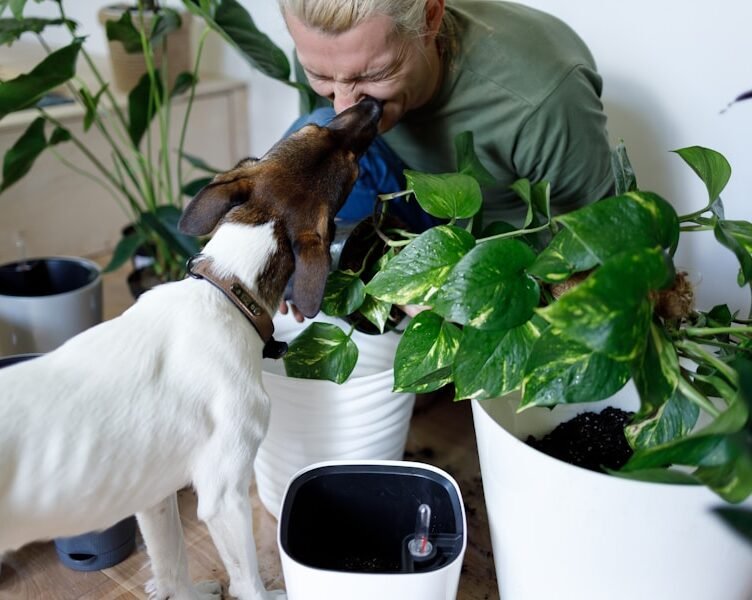Incorporating pet-friendly plants into your bedroom can have a multitude of benefits for both humans and animals. One of the primary advantages is the improvement of air quality, as these plants absorb toxins and release oxygen, leading to better sleep quality and overall health for all occupants. Additionally, the presence of plants in the bedroom can create a calming ambiance, reducing stress and anxiety levels for both humans and pets.
Furthermore, pet-friendly plants can add a touch of natural beauty to the bedroom, making it a more welcoming and comfortable space for everyone. Moreover, pet-friendly plants can also provide mental stimulation and enrichment for pets. Many animals enjoy exploring and interacting with plants, which can serve as a source of entertainment and mental stimulation.
This can be particularly beneficial for pets that spend extended periods indoors, as it can help prevent boredom and behavioral issues. Overall, incorporating pet-friendly plants into the bedroom can create a healthier, more enjoyable environment for both humans and pets.
Key Takeaways
- Having pet-friendly plants in your bedroom can improve air quality and create a calming environment for both you and your pet.
- The top 5 pet-friendly plants for a healthy and safe environment include spider plants, Boston ferns, African violets, Areca palms, and bamboo palms.
- When choosing pet-friendly plants for your bedroom, consider your pet’s behavior and any potential toxicity of the plants.
- Caring for pet-friendly plants in your bedroom involves proper watering, lighting, and occasional pruning to keep them healthy and safe for your pet.
- Common misconceptions about pet-friendly plants and pets include assuming all plants are safe for pets and neglecting to research potential toxicity.
Top 5 pet-friendly plants for a healthy and safe environment
When choosing pet-friendly plants for your bedroom, it’s important to select ones that are safe for your pets to be around.
Safe and Air-Purifying Options
Some top pet-friendly plants that are safe for both cats and dogs include spider plants, Boston ferns, African violets, bamboo palms, and areca palms. Spider plants are known for their air-purifying properties and are safe for pets to be around.
Low-Maintenance and Pet-Friendly
In addition to being safe for pets, these plants are also relatively easy to care for, making them ideal choices for a bedroom environment. They thrive in low light conditions, making them perfect for bedrooms with limited natural light.
Benefits of Pet-Friendly Plants
These plants also have the added benefit of being non-toxic to pets, so you can have peace of mind knowing that your furry friends are safe around them. Boston ferns are non-toxic to pets and can help improve air quality in your bedroom. African violets are safe for pets and add a pop of color to your bedroom. Bamboo palms and areca palms are both safe for pets and can help create a tropical feel in your bedroom.
How to choose the right pet-friendly plants for your bedroom
When choosing pet-friendly plants for your bedroom, there are several factors to consider to ensure that you select the right ones for your space. Firstly, consider the amount of natural light in your bedroom. Some pet-friendly plants thrive in low light conditions, while others require more sunlight to thrive.
If your bedroom has limited natural light, opt for plants that can thrive in these conditions, such as snake plants or peace lilies. Additionally, consider the size of your bedroom and the amount of space you have available for plants. Some pet-friendly plants, such as spider plants or African violets, are compact and can easily fit on a bedside table or dresser.
Furthermore, consider the specific needs of your pets when choosing pet-friendly plants for your bedroom. Some pets may be more prone to chewing on plants, so it’s important to select ones that are non-toxic to pets. Additionally, some pets may have allergies to certain types of plants, so it’s important to choose ones that won’t trigger any allergic reactions in your pets.
By considering these factors, you can select the right pet-friendly plants for your bedroom that will thrive in your space and be safe for your pets to be around.
Tips for caring for pet-friendly plants in your bedroom
| Plant Name | Pet-Friendly | Benefits |
|---|---|---|
| Spider Plant | Yes | Improves air quality |
| Areca Palm | Yes | Removes toxins from the air |
| Boston Fern | Yes | Humidifies the air |
| Parlor Palm | Yes | Easy to care for |
Caring for pet-friendly plants in your bedroom is relatively simple, but there are a few tips to keep in mind to ensure that they thrive in your space. Firstly, be mindful of watering your plants. Overwatering can lead to root rot, while underwatering can cause the plants to wilt and die.
It’s important to water your plants according to their specific needs and the conditions in your bedroom. Additionally, be sure to regularly dust the leaves of your plants to keep them clean and free from dust and debris. Furthermore, consider fertilizing your pet-friendly plants to promote healthy growth.
Use a balanced fertilizer specifically formulated for indoor plants and follow the instructions on the label. Additionally, be mindful of pests that may affect your pet-friendly plants. Keep an eye out for signs of pests such as yellowing leaves or sticky residue on the leaves, and take appropriate measures to address any pest issues that arise.
By following these tips, you can ensure that your pet-friendly plants thrive in your bedroom and contribute to a healthy and inviting environment.
Common misconceptions about pet-friendly plants and pets
There are several common misconceptions about pet-friendly plants and their interaction with pets that should be addressed. One common misconception is that all houseplants are toxic to pets, which is not true. There are many pet-friendly plants that are safe for cats and dogs to be around, so it’s important to do your research and select the right ones for your space.
Additionally, some people believe that all pets will chew on houseplants, which is not always the case. Many pets have no interest in chewing on plants, while others may be trained not to do so. Another common misconception is that all pet-friendly plants require a lot of maintenance, which is not necessarily true.
There are many low-maintenance pet-friendly plants that are easy to care for and thrive in indoor environments with minimal effort. By addressing these misconceptions, you can make informed decisions about incorporating pet-friendly plants into your bedroom and create a safe and enjoyable environment for both you and your pets.
Creating a pet-friendly bedroom with plants: design and placement tips
Choose Plants that Complement Your Decor
Firstly, consider the overall aesthetic of your bedroom and select pet-friendly plants that complement the existing decor. Choose plants with colors and textures that enhance the visual appeal of your bedroom and create a cohesive look.
Optimize Plant Placement
Additionally, consider the placement of your pet-friendly plants in your bedroom. Place them in areas where they will receive adequate natural light without obstructing pathways or creating clutter. Consider using hanging planters or wall-mounted shelves to maximize space and create visual interest in your bedroom.
Create a Lush Display
Furthermore, consider grouping different types of pet-friendly plants together to create a lush and dynamic display that adds depth and dimension to your bedroom. By following these design and placement tips, you can create a pet-friendly bedroom with plants that enhances the overall aesthetic of your space while providing numerous benefits for both you and your pets.
Alternatives to traditional pet-friendly plants for your bedroom
If you’re unable to incorporate traditional pet-friendly plants into your bedroom due to allergies or other limitations, there are several alternatives that can provide similar benefits without posing any risks to your pets. One alternative is to use artificial plants or silk flowers as a substitute for traditional houseplants. These options can add a touch of greenery to your bedroom without requiring any maintenance or posing any risks to your pets.
Another alternative is to use air-purifying devices such as air purifiers or salt lamps to improve the air quality in your bedroom without the need for traditional houseplants. These devices can help remove toxins from the air and create a healthier environment for both you and your pets without the need for live plants. Additionally, consider incorporating natural elements such as wood or stone into your bedroom decor to create a connection with nature without the need for traditional houseplants.
By exploring these alternatives, you can create a pet-friendly bedroom that provides numerous benefits for both you and your pets without the need for traditional pet-friendly plants. In conclusion, incorporating pet-friendly plants into your bedroom can provide numerous benefits for both you and your furry friends. By selecting the right pet-friendly plants, caring for them properly, and addressing common misconceptions about their interaction with pets, you can create a healthy and inviting environment that enhances the overall aesthetic of your space while providing mental stimulation and enrichment for your pets.
Whether you choose traditional pet-friendly plants or explore alternative options, creating a pet-friendly bedroom with plants is a rewarding endeavor that can enhance the well-being of both you and your beloved pets.
FAQs
What are the best pet-friendly plants for a bedroom?
Some of the best pet-friendly plants for a bedroom include spider plants, Boston ferns, and African violets. These plants are non-toxic to pets and can help improve air quality in the bedroom.
Why is it important to choose pet-friendly plants for a bedroom?
Choosing pet-friendly plants for a bedroom is important because it helps ensure the safety of your pets. Many common houseplants can be toxic to cats and dogs if ingested, so selecting non-toxic plants is crucial for pet owners.
How can pet-friendly plants benefit a bedroom?
Pet-friendly plants can benefit a bedroom by improving air quality, reducing stress, and adding a touch of natural beauty to the space. Additionally, some plants can help regulate humidity levels, creating a more comfortable environment for both pets and humans.
What are some other pet-friendly plants that are suitable for bedrooms?
In addition to spider plants, Boston ferns, and African violets, other pet-friendly plants suitable for bedrooms include parlor palms, areca palms, and money plants. These plants are non-toxic to pets and can thrive in indoor environments.
How can I ensure the safety of my pets around houseplants in the bedroom?
To ensure the safety of your pets around houseplants in the bedroom, it’s important to research each plant’s toxicity level and keep them out of reach of curious pets. Additionally, monitoring your pets’ behavior around the plants and seeking veterinary advice if ingestion occurs is crucial for pet safety.





